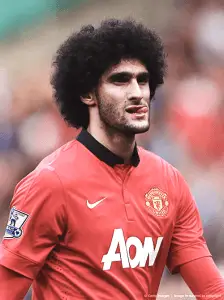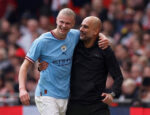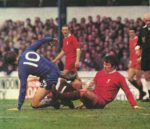It’s been a rollercoaster ride at Manchester United since Moyes took over. Over the summer Utd’s hapless approach to transfer deals seemed to confuse, rather than persuade, most teams they were negotiating with; they then had their poorest start to the league in over decade, and are right now pinning all their hopes on an 18 year old who scored 2 goals against a managerless Sunderland. Somewhere in between the weekly trials and tribulations Moyes signed his former mascot Fellaini (which itself turned into a farce when United tried to wait for a lower fee, and instead ended up paying more than necessary).
It has become somewhat of a trend for managers to secure former players when they move clubs – Thiago also followed Guardiola to Bayern, Mourinho re-signed his old Inter pal E’too for Chelsea, and Rudi Garcia signed Gervinho for the third time when he took over at Roma. There are plenty of reasons managers do this: to instill a certain culture, to have a trustworthy influence in the dressing room, or simply to work with a player who is reliably good.
Under scrutiny, however, it’s difficult to see just what Fellaini brings to Man Utd. As a mark of intent, it also brings with it some worrying signs as to what exactly Moyes will do with the Man Utd team, and indeed, if he even knows what he wants to do in the first place.
United fans have been clamouring for a strengthening of the midfield for seasons now. Even their title winning side of 2011 featured the inconsistent and constantly-questioned talents of Anderson, Cleverley, Fletcher, and even Carrick. An over-dependence on the aging Scholes and Giggs (possibly still their best central midfielders with the exception of Carrick) only adding further fuel to the flames.
So Fellaini might seem like the right key in the right hole – apart from the fact he is just as confounding a player as any other current United midfielder. Signed for a club record 15 million by Everton, he has alternated between playing in a defensive midfield, and an attacking midfield role. He hit a purple patch last season, scoring 12 goals, and carving out a bizarre role as a physically-imposing playmaker. Whether it was his size, his constant fouling/being fouled, or his aggressive nature, his run of good form seemed just that, a run, and faded out dramatically towards the end of last season.
His aerial ability is never in doubt, whether in the middle of the park or the penalty box (at either end), but at a time when even Stoke are trying to play a more considered, ground-based type of football, it’s rather counter-intuitive for United to sign a player whose greatest asset is in having a hairdo bigger than the ball.
Looking at the stats Fellaini is an excellent tackler, one of the best in the league, matched only by…Carrick. So United now possess two of the best tacklers in the league, though Carrick’s pass completion and interception stats are almost three times better. In terms of attacking intent, Fellaini offered 12 goals and 6 assists – a decent ratio, though when compared to Rooney, Van Persie, and the rest of the United team (who, incidentally, had the highest number of goalscorers in the league last season) makes Fellaini’s stats seem somewhat average.
Stats aren’t everything though, and perhaps Moyes wanted someone who was a bit of an all rounder, but if United’s midfield have one thing in abundance, it’s jacks-of-all-trades – Cleverley, Anderson, Fletcher, Carrick, Valencia, – Ferguson’s predilection with all-round players tasked with both defensive and attacking duties is arguably what brought Man Utd to this point, and has fans screaming for the kind of dedicated destroyer/creator relationships that other league contenders are currently built around.
But possibly the most distractingly obvious clash concerning Fellaini and the current team is just how slow he is. Slow in a team that is, and always has been, about quickness – of both foot and mind. The last time United signed an undeniably talented player who seemed unable to break into anything more than a gentle jog, Berbatov underwent a pretty arduous (or easy, considering he spent much of the time on the bench) time. Berbatov’s talent was undeniable, and even becoming joint top-scorer in the premiership wasn’t enough to stop him being replaced as soon as the new season rolled around by the quicker and more mobile Hernandez.
Moyes’ Everton were characterised by diligent organisation, good teamwork, and a somewhat slow and predictable build-up in front of goal that always held them back (see how Yakubu, Saha, Bilyaletdinov, Drenthe and Anichebe all struggled, whilst Jelavic, Mirallas, and Pienaar all struggle to score as much as players of their quality ought to). It’s one thing to place his imprint onto the team, but he would have to entirely dismantle and rebuild this current United squad entirely in order to accommodate anything close to his previous style at Everton. But the question remains – if he is going to play to United’s current strengths or show any kind of flexibility, why sign Fellaini?
-Johnny Peters










Recent Comments